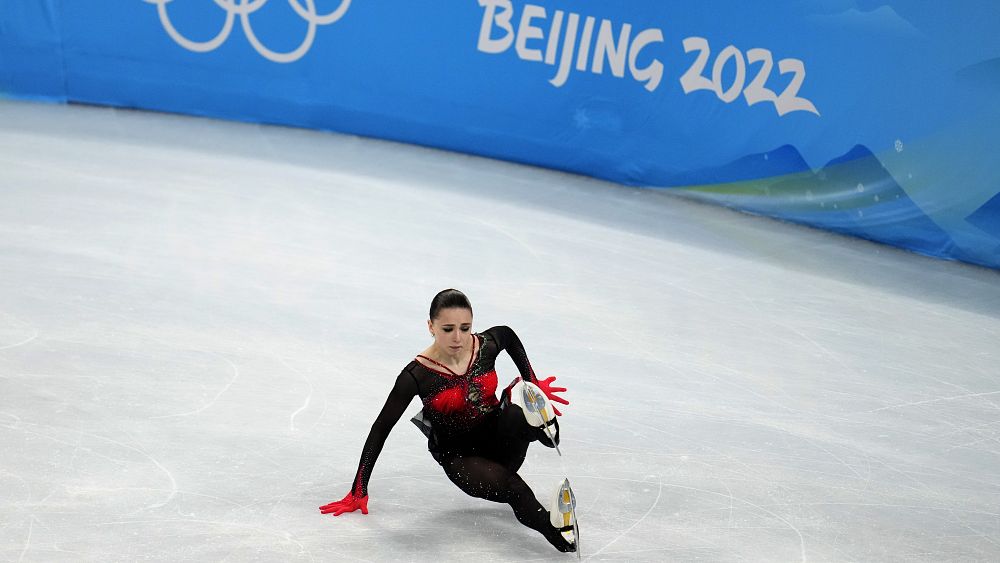
Ice skaters will have to be at least 17 years old to compete in professional competitions after the sport’s governing body voted Tuesday to increase the minimum age from 15.
The decision by the International Skating Union (ISU) congress in Phuket, Thailand, follows controversy surrounding the Russian figure skater Kamila Valieva at this year’s Beijing Winter Olympics.
“It’s a very historic decision,” ISU president Jan Dijkema said, after 100 countries voted to support the measure, while only 16 opposed.
Then 15-years-old, Valieva tested positive for a banned substance in a pre-game doping test before the 2022 Olympic contest.
She was allowed to compete, but broke down in tears after falling multiple times during her performance, with the global spotlight on her.
Valieva, who had been tipped for a gold medal, finished fourth.
The ISU said it planned to raise the age limit well before the Valieva case and acknowledged it had a duty of care to elite adolescent athletes.
In a news release, it said the decision was made “for the sake of protecting the physical and mental health, and emotional well-being of the skaters.”
The change will be phased in gradually. A minimum age of 15 will remain for the upcoming season, increase to 16 for the 2023-24 season and then raise to 17 for all following years, including the 2026 Winter Games.
This will disrupt the career of top Russian junior skater Sofia Akateva, who is 14. Her birthday falls days after the July 1 deadline to classify skaters’ ages for the upcoming season. Yet, having turned 18, she will be able to compete in 2026.
Before the vote, ISU director-general Fredi Schmid acknowledged the body had faced media pressure and a “major attack” in the wake of the Valieva controversy.
He told delegates at the conference the sport’s reputation was at stake.
“The moment of truth is obviously today because the credibility of the ISU will also be scrutinised,” he said. “The media and the public will watch us very closely so don’t forget this.”
The skating body’s medical team also backed raising the age limit to 17, arguing it would benefit young skaters physically and mentally, and help extend their careers.
“I feel as administrators of the sport of skating it is your moral obligation and duty to provide these young skaters with the opportunity and time to develop… the skills they require in order to be successful at the senior level,” Dr Jane Moran from the ISU’s medical commission said.
“They have the right to develop themselves as people during their adolescent age… They don’t need us to be forcing them to compete.”
A medical report published ahead of the decision said the change would allow junior athletes time to reach skeletal maturity.
“The concern is that during a period of known skeletal vulnerability, the adolescent athlete may be exposed to excessive training and competition loads associated with high-level competition, which places the athlete at greater risk of injury,” the medical report said.
It also warned that some elite adolescent athletes could experience a puberty delay for an average of two years because of the physical demands of training and inadequate energy intake. A greater risk of developing eating disorders was also noted.
The athletes’ commission surveyed close to 1,000 professional athletes and coaches and found that 86 per cent were in favour of lifting the age limit.
Some representatives from smaller countries argued the changes would have a negative impact on their talent pool and ability to send athletes to elite competitions.
However, other smaller skating nations, such as Iceland and Ireland, said the focus should be on protecting youngsters.
“We have to remember they are children first and athletes second,” Ireland’s ISU representative in Phuket said.
An amendment to raise the minimum age to 16 and then wait until after the 2026 Winter Olympics to revisit the issue was rejected.
The ISU drafted an age-limit proposal saying “burnout, disordered eating, and long-term consequences of injury” were a risk to young teenage skaters who are pushed to perform more quadruple jumps.
The decision was criticised in Russia, where skaters are currently banned by the ISU from international competitions because of the country’s military invasion of Ukraine.